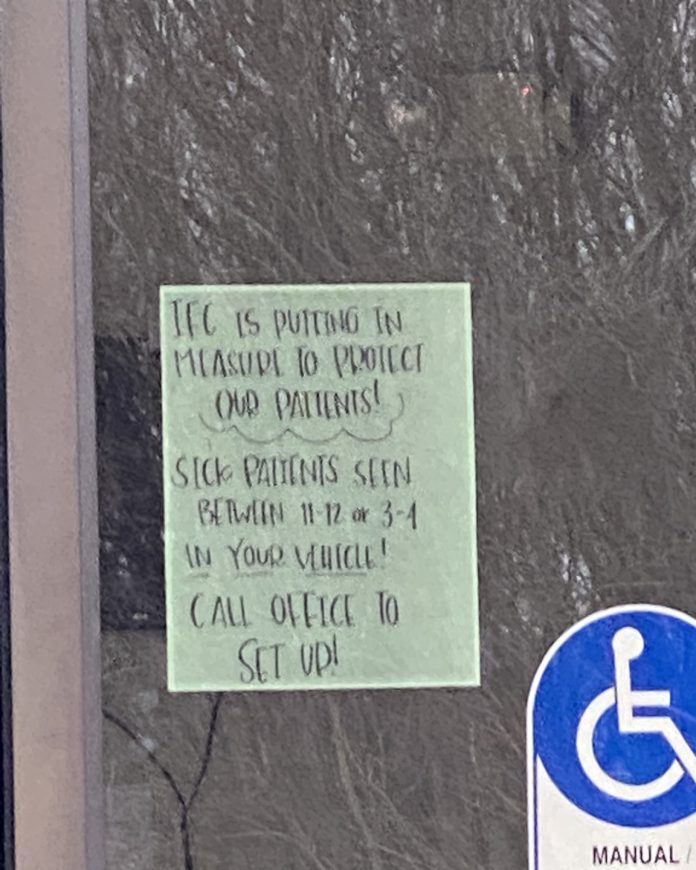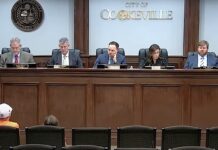By Michelle Price
Special to the UCBJ
COOKEVILLE – Cookeville doctors have gotten creative in dealing with sick patients from pediatrics and family medicine to urgent care clinics. The tactics range from treating patients in their cars to using separate entrances for sick patients versus well visits.
Dr. Chet Gentry at Innovative Family Care was one of the first in Cookeville to institute a policy for patients with symptoms of respiratory infections, treating them in their car while still in the parking lot.
LabCorp made COVID-19 tests available to local doctor’s offices last Thursday, and Gentry incorporated the tests for these respiratory patients.
“We would test them out in the car. So, we were kind of doing drive-thru testing all Friday,” explained Gentry.
Currently of the 98 positive COVID-19 tests in the state, none are within the Upper Cumberland region.
Cookeville Pediatrics began seeing their patients with respiratory symptoms in their cars early this week, according to Dr. Leslie Treece. The office would evaluate patients for any cough, wheeze or fever and then decide who could come in the side door for further assessment.
Cookeville Pediatrics did its first COVID-19 test on Monday and is still waiting for the results.
On Monday, patients of Satellite Med received an email asking patients being seen for a well visit (physical, checkup, etc.) to use the back door, while sick patients would enter and check-in normally at the front.
The urgent care clinic also changed their hours earlier this month, now closing at 4 p.m. Monday through Friday and closed on weekends. The clinic has added “telemed” hours from 7-8 p.m. Sunday to Thursday.
More local physicians are adding telemedicine as a way to protect their patients from this virus.
Before this week, Medicare would not “allow” primary care docs to make telemedicine visits, only specialists could make them, but Tuesday, Centers for Medicare and Medicaid Services Administrator Seema Verma announced in a press conference at the White House on Tuesday that the administration was lifting restrictions to allow this service to expand.
“This action is a part of our broader effort to ensure that government requirements, [and] rules and regulations don’t get in the way of patient care during an emergency,” said Verma.
With the announcement, telemedicine services are now being expanded beyond just the rural areas and brief visits that were previously covered, Verma said. “These services can be provided in a variety of settings, including nursing homes, hospital outpatient departments, and more.”
The new agreements also relax restrictions around HIPAA compliance so that doctors can use their phones. Furthermore, the government said it would be using discretion when it comes to collecting co-pays to further reduce the costs of telemedicine services, according to Verma.
There is still so much uncertainty around the disease that doctors are constantly on their toes regarding anything that relates to it.
“People that might have a respiratory illness, we are testing them out in their car. We aren’t bringing them into the office,” Gentry shared. “We’re paying very close attention to hand washing and universal precautions in the office. We are doing much more phone contact with patients.”
Gentry explained the reason for the office initiating contact with its regular patients, “It’s always more beneficial to see a patient face-to-face, but we’re trying to minimize exposure to patients and healthcare workers and minimize opportunities for the social spread and flatten the curve, which is the goal of the measures in place right now.”
COVID-19 has caused doctors to expand to more innovative practices in treating patients amid the pandemic.
Gentry agreed and added, “Every day we are modifying our office procedures based on CDC guidelines, Department of Health guidelines and evidence-based knowledge that rolls out from institutions that are doing surveillance, like Johns Hopkins.”








